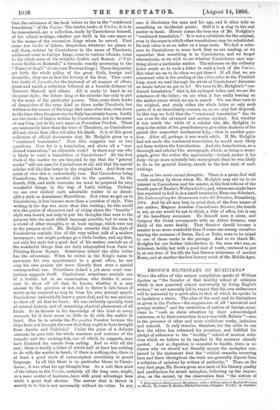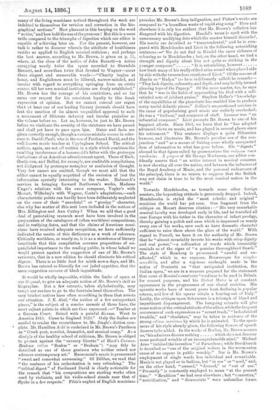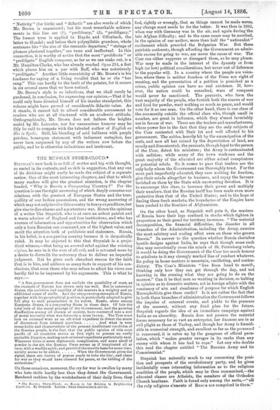BROWN'S DICTIONARY OF MUSICIANS.•
WHEN the editor of this unique compilation speaks of William Ayrton as "the founder of that healthy school of criticism which is now practised almost universally by living English writers," me are naturally led to expect that his own endeavours will be animated by a spirit akin to that of which he speaks in so laudatory a strain. The plan of the work and its limitations as given in the Preface—the suppression of all "anecdotal and gossipy matter," and the restriction of notices of foreign musi- cians to " such as claim attention by their acknowledged eminence, or by their connection in any way with Britain "—are, in the presence of other and more ambitions works, judicious and natural. It only remains, therefore, for the critic to see how the editor has redeemed his promises, and fulfilled his pledge of adherence to the " healthy " school of musical criti- cism which we believe to be implied in the sentence already quoted. And as digestion is essential to health, there is no reason why we should not literally accept the metaphor con- tained in the statement that the " critical remarks occurring here and there throughout the work are generally digests from a collation of opinions by writers of authority." Thus, on the very first page, Mr. Brown gives us a taste of his literary quality and predilection for mixed metaphor, following up the impres- sion, on the second, by the observation that " the notices of • Biographical, Dictionary of Musicians ; with a Bibliography of English Writings on Music, By James D. Brown, Mitchell Library, Glasgow. PaLiley : A. Gardner. -tnany of the living musicians noticed throughout the work are indebted to themselves for revision and correction in the bio- graphical sections." How pleasant is this harping on the word " notice," and how bold the use of the pronoun ! But this is a mere -trifle compared to the triumphs of digestion which our editor is capable of achieving later on. For the present, however, our task is rather to discover wherein the attribute of healthiness -resides as applied to English musical criticism ; and perhaps the best answer, according to Mr. Brown, is given on p. 55, where, at the close of the notice of John Barnett—a notice -occupying nearly twice the space accorded to Sterndale Bennett, and more than twice that devoted to Wagner—occur these elegant and memorable words :—" Charity begins at borne, and Englishmen must be illiberal, narrow-minded, and insular with regard to everything springing from an exotic -source, till her own musical institutions are firmly established." Mr. Brown has the courage of his convictions, and so far earns our respect for his consistent loyalty to this frank expression of opinion. But we cannot conceal our regret that at least one of our leading literary journals should have lent the sanction of its almost unqualified approval to such -a monument of illiterate industry and insular prejudice as the volume before us. Let us, however, be just to Mr. Brown before we vindicate the severity of the strictures we have passed -and shall yet have to pass upon him. Dates and facts are given correctly enough, though a curious mistake occurs in refer- ence to David (Paul), who is the son of Ferdinand David, and the well known music teacher at Uppingham School. The critical notices, again, are not all written in a style which combines the 'rambling incoherence of a honsemsid's letter with the grotesque ,barbarisms of an American advertisement agent. Those of Bach, 03eethoven, and Bellini, for example, are creditable compilations, not disfigured by grotesque metaphor or confusion of thought. 'Very few names are omitted, though we must add that the -editor cannot be equally acquitted of the omission of just the information specially interesting to the reader. Habeneck's services in bringing forward Beethoven's works, Madame Unger's relations with the same composer, Vogler's with Mozart, Wilhelmj's with Wagner, Costa's adaptations,—such .characteristic points can hardly have been deliberately neglected on the score of their " anecdotal " or " gossipy " character, -else why has matter of this sort been included in the notices of Mrs. Billington and Ann Catley ? When we add that a good sdeal of painstaking research must have been involved in the preparation of the catalogues of (often worthless) compositions, and in verifying dates, and that the claims of American musi- cians have received adequate recognition, we have sufficiently dedicated the merits of this dictionary as a work of reference. Critically worthless, or nearly so, it is as a storehouse of literary ineptitude that this compilation assumes proportions of un- paralleled importance to the reading public, in whose behalf we would protest against the suggestion of one of Mr. Brown's -reviewers, that in a new edition he should eliminate his critical 'digests. There is so little food for mirth now-a days, and Mr. Brown has catered so liberally for our jaded appetites, that the -mere suggestion savours of black ingratitude.
It would be wholly impossible, within the limits of space at -our disposal, to give an adequate notion of Mr. Brown's skill as biographer. Bat a few extracts, taken alphabetically, may tempt our readers to go to the fountain-head themselves. The -very briefest notices have often something in them that arrests our attention. J. E. Abel, the author of a few unimportant pieces," is the subject of a concise memoir of three lines, the ,most salient points in which are thus expressed :—" Teacher at a German Court. Seized with a painful disease. Went to America 1819. Came to England 1820." Only the dashes are needed to render the resemblance to Mr. Jingle's diction corn- • Vete. Mr. Hamilton Aide is enshrined in Mr. Brown's Pantheon as " Greek poet, novelist, dramatist, and musical comp." A s a -disciple of the healthy school of criticism, Mr. Brown is obliged to protest against the " savoury libretto" of Bizet's Carmen. Brahms (alias " Brahm " or " Braham ") "may fitly be 'described as one of those geniuses who neither retard nor advance contemporary art." Buononcini's music is pronounced sweet and somewhat unmeaning." Of Delibes, we read that -" the neatness of his orchestration is very refreshing." The 'critical digest" of Ferdinand David is chiefly noticeable for the remark that " his compositions are sterling works often used by violinists, and his violin-school stands near that of Opohr in a few respects." Fetis's neglect of English musicians provokes Mr. Brown's deep indignation, and Flotow's works are compared to "a boundless waste of vapid sing-song." Here and elsewhere it is only too evident that Mr. Brown's collation has disagreed with his digestion. Handel's name is spelt with the. unnecessary modifying dots which the master himself discarded. His merits are described as "transcendental," and he is com- pared with Mendelssohn and Liszt in the following astonishing sentences :—" We do not find in Handel the same richness of colouring as in Mendelssohn ; but, on the other hand, we find a strength and dignity about him not quite so striking in the
younger composer." .. " It is astonishing, however how fresh many of his really stilted arias sound when placed side by side with the tremendous creations of Liszt." Of the masses of Haydn or " Hadye (as he is indifferently called) he remarks- " They lack dignity, solemnity, and depth, and may be fitly termed pleasing toys of the Papacy." Of the same master, too, he says that he " was in the habit of approaching his God with a self- satisfied note of jubilant praise." Stephen Heller's "knowledge of the capabilities of the pianoforte has enabled him to produce many useful didactic pieces." Jullien's unquestioned services in the cause of popularising good music are entirely overlooked. He was a "buffoon," and composer of stuff. Lesueur was " an influential composer." Liszt prompts Mr. Brown to one of his happiest efforts. Since 1861, we learn that he "has adopted advanced views on music, and has played in several places since his retirement." This sentence displays a quite Hibernian humour, and illustrates Mr. Brown's peculiar use of the con- junction " and " as a means of linking some wholly unexpected item of information to what has gone before. His "digests" abound in that figure called by grammarians the ssis',,,,:ss e-s.0 ssposiiosixs. A propos of Sir George Mscfarren, our editor con- fidently asserts that " an active interest in musical concerns is now showing all over the nation, and between the influence of the Royal Academy of Music, and the personal endeavours of the principal, there is no reason to suppose that the British may not claim in time to be the most musical nation in the world."
Towards Mendelssohn, as towards some other foreign masters, the boycotting attitude is generously dropped. Indeed, Mendelssohn is styled the " most eclectic and original " musician the world has yet seen. One fragment from the critique on Mozart deserves citation :—" His very remarkable musical faculty was developed early in life, and he travelled all over Europe with his father in the character of infant prodigy, thereby gaining a polish and ease which is impressed on nearly every one of his works, save such as have dramatic character sufficient to raise them above the gloss of the world." With regard to Purcell, we have it on the authority of Mr. Brown that he " almost invariably invests his works with crisp dignity and real power,"—a collocation of words which irresistibly reminds us of the signs of " a genuine thoroughbred Snark." The style of Romberg is pronounced " careful and un- affected," which is, we suppose, Brownesque for simplex munditiis, and after a vigorous onslaught made in the notice of Donizetti on "that antiquated institution, the Italian opera," we are in a measure prepared for the statement that some of Rossini's overtures "continue to be used in Britain for concert purposes, and his Stabat Mater is of constant appearance in the programmes of our choral societies. His operatic works have of recent years been declining in popular esteem, and few of his operas obtain a hearing out of Italy." Lastly, the critique upon Schumann is a triumph of bland and impertinent disparagement. The foregoing extracts will give some notion of the critical attitude of the editor, while the frequent occurrence of such expressions as " arrant trash," " lackadaisical twaddle," and "charlatan," may be taken in evidence of the strong odium musicuat by which he is animated. To the speci- mens of his style already given, the following flowers of speech deserve to be added. In the works of Berlioz, Mr. Brown assures us," his admirers discern nothing which does not discover some profound wrinkle of an incomprehensible mind." Michael Arne "imbibed the invention " of Paracelsus ; while Brookbanck is described as "one of the original writers in the worm-eaten cause of no organs in public worship." Nor is Mr. Brown's employment of single words less individual and remarkable. Music is not played or in fashion, but " in use" or " used," and, on the other hand, " Imaged," "disused," or "out of use." " Presently " is constantly employed to mean "at the present time." "Rendition" we had seen elsewhere ; but " concertize," "revivification," and " disassociate " were unfamiliar forms.
" Nativity " (for birth) and 4‘ didactic " are also words of which Mr. Brown is enamoured ; but his most remarkable achieve- ments in this line are (1). "prolificacy," (2), " proli6gacy." The former term is applied to Haydn and Offenbach, the latter to Handel ; and before their polysyllabic grandeur, whole sentences like "the rise of the romantic departure," "strings of phrases plastered together," are tame and ineffectual. In this connection, it is worthy of notice that the most " prolificate " or "prolifigate" English composer, as far as we can make out, is a Mr. Hamilton Clarke, who has already reached Opus 214, a feat which places him on a par with Raff, who was notoriously "prolifigate." Another little eccentricity of Mr. Brown's is his fondness for saying of a living vocalist that he or she "has sang." This can hardly be the fault of the printer, for it occurs in six several cases that we have noticed.
Mr. Brown's style is so infectious, that we shall surely be pardoned, in conclusion, for expressing our opinion,—That if he could only have divested himself of his insular standpoint, this volume might have proved of considerable didactic value. As it stands, it cannot fail to afford considerable amusement to readers who are at all tinctured with an academic attitude. Orthographically, Mr. Brown does not fathom the heights scaled by Mr. Leicester, nor for unconscious humour may he fitly be said to compete with the talented author of English as She is Spoke. Still, his blending of arid baldness with purple patches, homespun statement with indiscreet metaphor, has never been surpassed by any of the writers now before the public, and he is otherwise industrious and irrelevant.




































 Previous page
Previous page